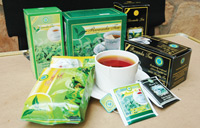Despite Ocir-Thé efforts to increase tea production by 35,000 metric tonnes by 2012, prices of tea, and coffee have increased on the international market as compared to the previous month.


Despite Ocir-Thé efforts to increase tea production by 35,000 metric tonnes by 2012, prices of tea, and coffee have increased on the international market as compared to the previous month.
According to Anthony Butera, Ocir-Thé’s Director General, the prices might stay stable or increase slightly but the average change will be slightly higher than last year’s with no big impact.
About 62 percent of Rwanda’s tea is sold thought the weekly Mombasa auction market. Only 37 percent is through direct sales while the remaining one percent is collected from local sales. Tea is the leading crop in export earnings for Rwanda.
"In Mombasa we are expecting a low supply on the market and in any case the lower the supply the higher the demand and the higher the price, so there might be a slight increase of prices,” Butera Explained.
At the Mombasa auction where many African countries sell their tea, the average price increased to $2.22 (Rwf1, 256.7) a kilo from $2.21 (Rwf1, 251.08); also Colombo and Kolkata auctions can also face a slight increase or stay stable.
Globally, tea prices have risen because production has fallen following an unfavourable weather condition in India while the demand for the commodity in Europe is strong.
In 2008, tea fetched total revenues of $45 million (Rwf25.5 billion) and now the agency targets $54 million (Rwf30.6 billion) this year.
Also the Cotton A index price has increased to $1.36 (Rwf769.76) a kilo last month from $1.25 (Rwf707.5) the preceding month while that of cotton Memphis price jumped to $1.5 (Rwf849) a kilo from $1.35(Rwf764.1).
Rwanda earns most of its foreign exchange from exporting agricultural traditional commodities such as tea, cotton, coffee and sisal.
Ends


